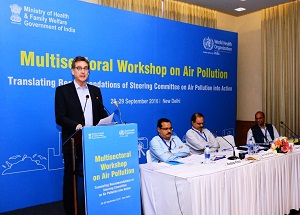Translating recommendations of Steering Committee into action

Recognizing that air pollution is a serious health hazard in India, the Ministry of Health & Family Welfare (MoHFW) and WHO Country Office for India joined hands to organize a two-day multisectoral workshop on 28-29 September 2016 in New Delhi to build stakeholder commitment for multisectoral response to address the rising concern of air pollution and its health effects in India.
The workshop focused on tackling the health effects of air pollution in a concerted manner and garnering multisectoral commitment to translate the Steering Committee recommendations into action.
Speaking on the occasion, Dr Arun Kumar Panda, Additional Secretary, MoHFW said, “We have already lost time, we have to act now and create champions at each and every level to mitigate the effect of air pollution. Each ministry has a huge role in the fight against air pollution.”
In his address, Dr Henk Bekedam, WHO Representative to India emphasized on the need for coordinated multisectoral action to address both household and ambient air pollution, and to promote clean sources of energy, which will be able to cater to growing energy demand for power and domestic needs.
“Pollution is everybody’s business. A community approach would bring in not just greater awareness but also people’s participation to combat pollution, in their homes, in the communities they live in and their workplaces,” he added.
The deliberations proposed actionable recommendations that will help to reduce exposure to air pollution, increase access to clean sources of energy, and adopt measures needed to mitigate the health impacts of air pollution. The workshop ended by producing “The Delhi Commitment on Multisectoral Action for addressing air pollution”.
The workshop was attended by Dr Arun Kumar Panda, Additional Secretary (Health), MoHFW, Government of India; Mr Navdeep Rinwa, Joint Secretary, MoHFW; Ms. Ayumi Fujino, Representative and Regional Director for South Asia, United Nations Industrial Development Organization (UNIDO); Mr Vijay Samnotra, Head – United National Environment Programme, India; Dr Damodar Bachani, Deputy Commissioner (NCD), MoHFW; and Dr Henk Bekedam, WHO Representative to India along with representatives from seven central non-health ministries, New Delhi Municipal Council, experts from UN agencies, academicians, WHO Collaborating Centre on Environment and Occupational Health, NGOs, other specialized agencies and senior national and state level officials.
Air pollution is a major environmental health risk. Household air pollution is the second, and ambient air pollution is the seventh leading risk factor for diseases in India. Over 620 000 deaths and about 18 million Disability-Adjusted Life Years (DALYs) are attributable to Ambient Air Pollution in India, while over one million deaths and 31 million DALYS are attributable to Household Air Pollution in India.
